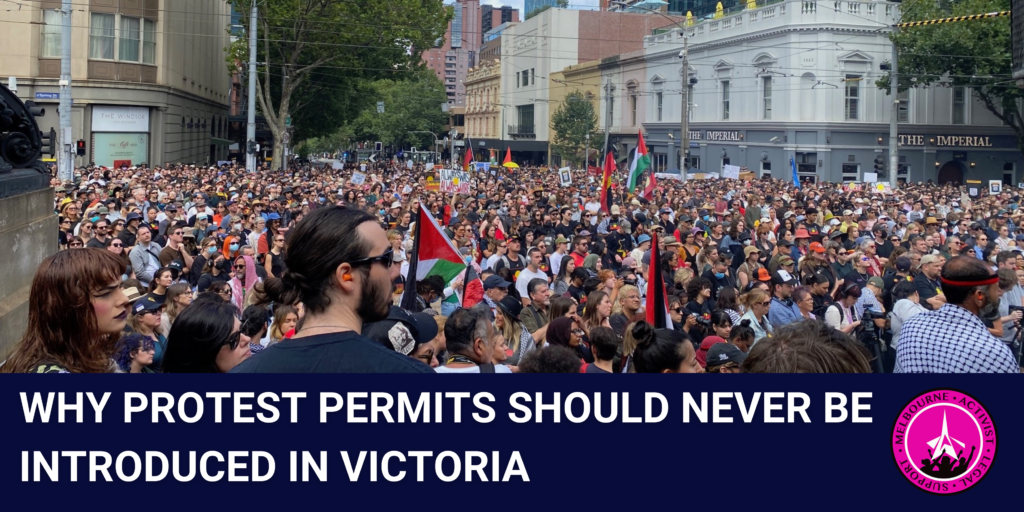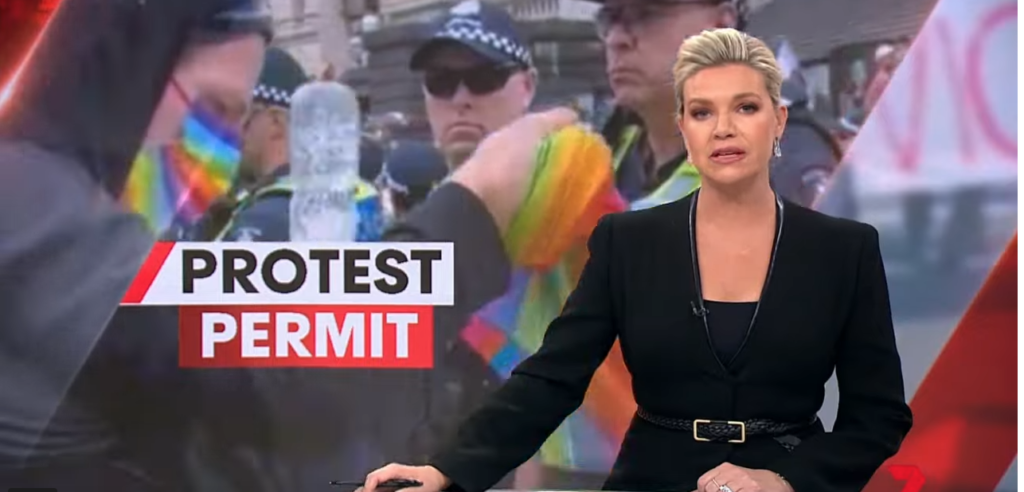The Case Against Protest Permits in Victoria
Even though the Victorian Government has rejected the recent proposal for a ‘protest permit’ system, it remains important that we understand the arguments against any permit, or authorising system being introduced.
In March 2024, Victoria Police Chief Commissioner Shane Patton formally requested Police Minister Anthony Carbines consider the introduction of a protest permit system similar to the one operating in New South Wales whereby organisers of protests must obtain a permit from police before holding a street protest. Victoria Police cited concerns about how often protests are being held in Victoria, the disruption caused to the community, and the “impact they are having on police resources”.
The call was not related to any one protest or incident and had been planned for many months. It was quickly backed by Wayne Gatt, Secretary of The Police Association Victoria (TPAV), who said that they have been calling for a permit system of some kind since at least 2019.
The Human Rights Law Centre (HRLC) immediately urged the Victorian Government to reject any proposal that would require protesters to obtain a permit to gather and demand change on issues they care about. “Requiring a police permit to participate in democracy will undermine the ability of every person in Victoria to exercise their right to peacefully protest”, the statement said.
Victorian Premier Jacinta Allen publicly rejected the idea on 25 March 2024, stating that a permit system “runs the risk of being a very lengthy, unwieldy, time-consuming process for both the police force and the court system.”
Whilst this is very welcome there are many concerns remaining.
Many local councils in Victoria still maintain protest permit or notification requirements in their local laws which cause a great deal of distress, confusion and delays for community groups wanting to hold protest events. The Greater Dandenong Council recently hampered the ability of a local protest group to hold a Free Palestine rally and march. “Just accessing a permit to have this event has been extremely difficult even after we gave approximately four-weeks notice,” an organiser reported.
You do not need permission from the City of Melbourne to conduct a demonstration, rally or protest or other form of public assembly.
It is likely that the Victorian Liberals and Nationals will support the idea of a statewide protest permit system and may include it within their broader policy to reintroduce the dangerous and draconian anti-protest move-on powers that were repealed in 2015 after a massive community and union campaign. These powers, which the Victorian Liberals and Nationals have repeatedly attempted to re-introduce, give police the ability to disperse protests and pickets at their own discretion and arrest people for breaching a move-on order.
Legal and human rights organisations, unions and social movement groups will need to remain vigilant to these anti-protest measures ever being introduced.

Here is a list of eight main reasons why protest permits should never be introduced in Victoria:
- They are used to suppress protests. Protest permit systems are commonly used by police and authorities to suppress protests. Even notification procedures are misrepresented in practice, and quickly become a de-facto system of ‘authorising’ protests. Experience in New South Wales, and wherever local councils retain a protest permit system, is that they are routinely used to pressure organisers to significantly alter protest plans or to dissuade organisers from holding the protest at all. NSW Police have repeatedly and incorrectly ‘warned’ people that attendance at unauthorised public assemblies is unlawful. The NSW Council for Civil Liberties has written to the Police Commissioner about the common misuse of the Form 1 process in NSW.
- They are used to criminalise protests. Protests that do not apply for or receive authorisation in time are often subject to harsher policing, more restrictions and, depending upon the authorisation regime, face a higher risk of criminal sanctions.
- They are unworkable, create ‘red tape’ and clog up the court system. Protest groups are often required to go to court to challenge police decisions to reject a permit. This takes time and resources. Any permit system or prior notification requirement in Victoria is likely to be challenged on the basis that it is inconsistent with the constitutional implied right to political communication and sections 15 and 16 of the Charter of Human Rights and Responsibilities (2006).
- They undermine human rights. Permit and notification systems flout international law and human rights jurisprudence. According to the United Nations Human Rights Committee (UNHCR), having to apply to authorities for a permit to protest undermines the right to protest. “A permit should not be a precondition to enjoying the right to protest”. (General Comment No. 37 (n i) 87) It also states that lack of notification should not render an assembly unlawful or be used as a basis for dispersing the assembly or imposing criminal penalties on participants or organisers.
- They cannot accommodate spontaneous protests. Protests in response to injustices, local or international events or atrocities will often fall outside arbitrary notification periods. Community concern is often heightened in the hours or days after an injustice occurs and protests held in the immediate aftermath can form a critical element of holding parties to account. A permit system would restrict or in some cases criminalise these protests. The UNHRC states clearly that authorities must accommodate spontaneous protests for which notification is not practicable or appropriate.
- They are discriminatory. Smaller, grassroots groups with less funding and infrastructure and groups from migrant or non-English speaking backgrounds are less likely to successfully navigate a permit system or have the resources to challenge decisions in the courts. The Victorian Aboriginal Legal Service was “alarmed” at potential impacts a protest permit system could have on the Aboriginal community in Victoria. Associate Professor Crystal McKinnon said the proposed permit system would be “a return to the mission days,” where police and authorities could control “where Aboriginal people can go and who we can see”.
- They are an affront to democracy. The very nature and purpose of protest and political demonstration is that they occur outside of political systems of power. Often it is the decisions and actions of these institutions that movements and events are criticising. Any system of authorisation, approval, or permit is antithetical to this basic core element of protest and political demonstration. David Mejia-Canales, Senior Lawyer at the Human Rights Law Centre, said “[h]aving to ask for permission from the government to protest the government is not only absurd, it is an affront to democracy.” Tarneen Onus-Browne, from the Victorian Aboriginal Legal Service (VALS) said a permit for protesting “defeats the point of a protest and impacts our democratic rights”.
- They are not needed. Melbourne and surrounding regional centres host hundreds of protests, community events, festivals, street closures and road works. Our city’s infrastructure has to respond to a wide range of planned and unplanned events that can disrupt city thoroughfares. Protests are often singled out by police and media whilst ignoring equal or far more significant disruption by roadworks, corporate events, or traffic accidents. The vast majority of large protest events are publicly promoted and police are notified well ahead of time. The vast majority of large protest events are publicly promoted and police are notified well ahead of time. Victorian Police are the most substantially funded police force in the country, with The Age previously reporting a $4 billion budget and 22,000 personnel, greater on both counts than the geographically larger and more populous state of NSW. MALS has often noted that there are far too many police at most protests. We assert that it is unnecessarily high policing levels at protests, not the number of protests, that is leading to ‘resource issues’. Traffic management and ‘resource concerns’ should never be used as an excuse to suppress something as vital to our democracy as protests.
Melbourne Activist Legal Support
Thanks to Legal Observers NSW, the Australian Democracy Network or assistance with this article.
References and further reading
Police permission for protests would set undemocratic path for Victoria – Statement by the Human Rights Law Centre, (25 March 2024)
Victorian Aboriginal Legal Service backs state government’s rejection of protest permit system, National Indigenous Times (30 March 2024)
Declaration of our Right to Protest (2023) PDF
General Comment 37 on Article 21 A Short Guide for Civil Society
Letter from the NSW Council for Civil Liberties to the NSW Police Commissioner (December 2022)
‘Red Tape Days before Protest’ Dandenong Star Journal (22 January 2024)
Protest law in New South Wales research paper- includes effects of protest permits/authorisation orders.

